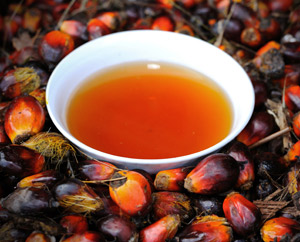
A-Z Indexes Food Health Guides
Health News |
Reading Up on Red Palm Oil This oil is a good source of beta-carotene, and a type of vitamin E known as tocotrienols Red palm oil has captured a lot of attention lately. But does the truth support the buzz? While its brilliant color does impart some unique properties, more research is needed to support specific health claims. In the meantime, this will help you sort fact from fiction. What it isRed palm oil is the unrefined version of regular, refined palm oil—a fat found mainly in the processed foods many people eat every day, such as crackers, chips, microwaveable meals, fast food, cookies, and cakes. Named for its bright color, it may also be referred to as virgin palm oil, crude palm oil, palm fruit oil, or palm kernel oil. Once red palm oil has been refined into regular palm oil, the bright red color, along with many of its potential health-promoting properties, has been removed. In its unrefined form, this oil is a good source of beta-carotene, and a type of vitamin E known as tocotrienols. Red palm oil doesn’t contain vitamin A, though our bodies can use beta-carotene in the oil to make vitamin A. Much of the fat found in red palm oil is of the saturated variety, which gives it a fatty acid profile similar to coconut oil. What it doesMany of the health claims about red palm oil are based solely on cell and animal research. These include potential cancer prevention, reducing risk of heart attacks, strengthening bones, dampening inflammation, lowering blood pressure, warding off malaria, and spurring weight loss. There are very few controlled human studies on red palm oil, so we don’t yet know if these claims will hold up for people. Heart diseaseOn the positive side, red palm oil has antioxidant properties, and appears to reduce levels of a protein linked with blood clotting, and this ability suggests it may lower risk of heart attacks and stroke. However, the few human trials on red palm oil that have been published suggest this fat may increase levels of total, and LDL, or “bad” cholesterol, neither of which is likely to benefit health or reduce heart disease risk. Only long-term, controlled trials in humans can prove—or disprove—these claims. Other health claimsTo date, there aren’t any human studies to support the other health claims listed above, and human research on red palm oil does not support claims of an anti-inflammatory effect. As the research on this intriguing substance continues to accumulate, we will gain a clearer picture of exactly what red palm oil can and can’t do for human health. The take-home messageIn the end, we are left with an incomplete picture about red palm oil’s potential health benefits. However, some key points about this newly popular product can help you make the best decisions for your health:
Suzanne Dixon, MPH, MS, RD, an author, speaker, and internationally recognized expert in chronic disease prevention, epidemiology, and nutrition, has taught medical, nursing, public health, and alternative medicine coursework. She has delivered over 150 invited lectures to health professionals and consumers and is the creator of a nutrition website acclaimed by the New York Times and Time magazine. Suzanne received her training in epidemiology and nutrition at the University of Michigan, School of Public Health at Ann Arbor. Copyright © 2025 TraceGains, Inc. All rights reserved. |
